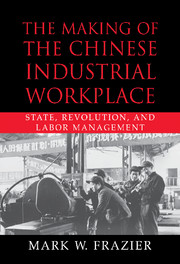Book contents
- Frontmatter
- Contents
- List of Tables
- List of Acronyms
- Preface
- 1 Introduction
- 2 Labor Management and Its Opponents, 1927–1937
- 3 Welfare and Wages in Wartime
- 4 Takeover Policies and Labor Politics, 1949–1952
- 5 Adjusting to the Command Economy
- 6 Enterprise Perspectives on the Command Economy
- 7 The Rise of “Party Committee Factories”
- 8 Conclusion
- Archives Consulted
- Bibliography
- Index
6 - Enterprise Perspectives on the Command Economy
Published online by Cambridge University Press: 15 December 2009
- Frontmatter
- Contents
- List of Tables
- List of Acronyms
- Preface
- 1 Introduction
- 2 Labor Management and Its Opponents, 1927–1937
- 3 Welfare and Wages in Wartime
- 4 Takeover Policies and Labor Politics, 1949–1952
- 5 Adjusting to the Command Economy
- 6 Enterprise Perspectives on the Command Economy
- 7 The Rise of “Party Committee Factories”
- 8 Conclusion
- Archives Consulted
- Bibliography
- Index
Summary
Much of the scholarship on industrial and labor management in China during the FFYP has focused on the areas of heavy industry in Northeast China, which also received prominent coverage in the state media during the 1950s. This earlier generation of scholarship, based largely on such official press accounts, revealed tensions within China's industrial enterprises over the organization of work and the role of intraenterprise organizations such as unions, party committees, and mass organizations. The opening of PRC archives in recent years has permitted scholars to take a closer look at shop floor politics and labor organization. While the perspective remains an official one, internal reports from city-level unions, Communist Party committees, and government departments offer revealing insights into the politics of the factory and the institutions that managers, workers, and intrafactory organizations pursued or resisted during China's transition to a planned economy. Each of the four enterprises discussed in preceding chapters experienced dramatic challenges to preexisting labor management institutions, as external political and economic controls generated new constraints as well as conflicts.
The purpose of this chapter is twofold: 1) to illuminate patterns of conflict that arose over wages, welfare provision, and labor organization as workers and managers resisted new state-imposed formal constraints and 2) to discuss variations in how these patterns of conflict unfolded across the textile and shipbuilding sectors in the cities of Shanghai and Guangzhou.
- Type
- Chapter
- Information
- The Making of the Chinese Industrial WorkplaceState, Revolution, and Labor Management, pp. 164 - 195Publisher: Cambridge University PressPrint publication year: 2002



